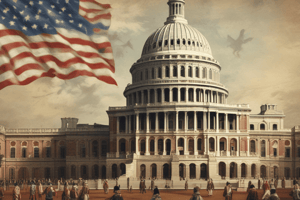Podcast
Questions and Answers
The British Parliament passed a series of laws known as the ______ Acts
The British Parliament passed a series of laws known as the ______ Acts
Intolerable
The primary objective of the First Continental Congress was to coordinate a united front against the ______ Acts
The primary objective of the First Continental Congress was to coordinate a united front against the ______ Acts
Intolerable
The First Continental Congress took place in 1774 at Carpenter's Hall in ______
The First Continental Congress took place in 1774 at Carpenter's Hall in ______
Philadelphia
The Articles of Association declared that a boycott of British goods would commence if the Intolerable Acts were not repealed by December 1, ______
The Articles of Association declared that a boycott of British goods would commence if the Intolerable Acts were not repealed by December 1, ______
The colonies' objections to the Intolerable Acts were expressed in a Declaration and ______
The colonies' objections to the Intolerable Acts were expressed in a Declaration and ______
The First Continental Congress asserted the right to life, liberty, and property without consent to any foreign ______
The First Continental Congress asserted the right to life, liberty, and property without consent to any foreign ______
Flashcards are hidden until you start studying
Study Notes
Colonial Demands During the First Continental Congress
In 1774, the British Parliament passed a series of laws collectively known as the Intolerable Acts, aiming to punish Massachusetts for the Boston Tea Party by closing its ports, installing a British general as governor, unilaterally changing the colony's charter, and canceling certain rights, including the right to hold meetings. These harsh measures sparked widespread opposition across the colonies, leading 12 of the 13 colonies to send representatives to the First Continental Congress.
From September 5 to October 26, 1774, the First Continental Congress took place at Carpenter's Hall in Philadelphia. Attended by delegates representing each colony except Georgia, the primary objective was to coordinate a united front against the Intolerable Acts and establish a collective strategy for resistance. They adopted the Articles of Association, which declared that if the Intolerable Acts were not repealed by December 1, 1774, a boycott of British goods would commence in the colonies.
The Congress also published a series of documents, including a Declaration and Resolves that expressed the colonies' objections to the Intolerable Acts and presented additional grievances against the British Crown. Key resolutions included:
- Right to Life, Liberty, and Property: Asserting that no colonial inhabitants had ceded the right to dispose of their lives, liberty, or property without consent to any foreign power.
- Natural Born Subjects: Recognizing that the original settlers were entitled to all the rights, liberties, and immunities of free and natural-born subjects within the realm of England.
- British Constitution: Affirming that the founding principles of the English Constitution protected these rights and liberties.
- Freedom from Taxation Without Representation: Upholding the principle that taxation without representation was unacceptable.
- Local Circumstances: Recognizing that the ability to exercise these rights varied depending on local conditions.
These declarations served as a rallying cry for the colonies, emphasizing their attachment to British values while asserting their autonomy and right to self-governance.
Studying That Suits You
Use AI to generate personalized quizzes and flashcards to suit your learning preferences.




